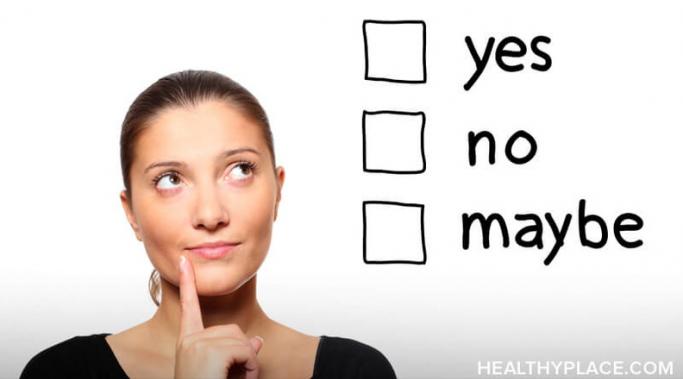As I wrote, some people believe that if you don't have a mental illness, you can't understand someone with a mental illness. I'm not sure this is true.
Talking About Bipolar
I have been writing about mental illness for almost a decade now and part of the reason was to try and help people understand bipolar disorder and other mental illnesses. And I have succeeded in some regards. I get emails from people quite frequently that tell me how much more they understand about the disease now that they have read my writings. I am tremendously gratified by this.
But, of course, I reach a tiny percentage of people and the issue of mental illness stigma still affects us all. And some people, no matter how hard we try to explain ourselves to them, never seem to understand mental illness.
Which begs the question: can a person without a mental illness ever really understand what we’re going through?
One of the challenging things about being a person with a mental illness who talks about psychiatry (and doesn’t hate it) is that all those people who do hate psychiatry perk up and get mad. These people often identify as “antipsychiatrists” and I’m not their biggest fan. While I consider it quite reasonable to question your doctor, psychiatrist, treatment, therapist and other treatment aspects, I consider going after an entire branch of medicine ridiculous. There is no “antioncology” faction in spite of the fact that a large percentage of people with cancer die (depending on the type, of course).
And this manifests in many of our lives. It’s not that antipsychiatrists just attack me; it’s that people of that mindset attack your average person who is just trying to deal with a mental illness. It’s the people who say, “mental illness doesn’t really exist” or “psychiatric medicine doesn’t work” or many other things that many of us hear online and in our real lives all the time.
So how do you talk to these people who have decided that your disease doesn’t exist and you shouldn’t be in treatment?
Mental illness symptoms are as cold and generic as inhumanly possible. “Depressed mood.” “Loss of energy or fatigue.” “Psychomotor retardation or agitation.”
Ah, yes, those things. They sound like a bummer.
Although, actually, they don’t. They sound like characteristics of a lab animal.
And one of the pesky symptoms of depression is “easy to tear.” You know, you cry a lot.
But everyone cries, so how bad could that possibly be?
One day I was in a pub eavesdropping on the girls deep in conversation next to me. They were chatting about bisexuals. They were commenting that they would never date a bisexual as really bisexuals were heterosexual that were just playing around with homosexuality and eventually they would “turn back” into heterosexuals.
Well, I, being bisexual was a little insulted by this. I have not “turned” into anything. I simply am bisexual like they are simply gay.
I realized though that it was lucky for me that I heard these girls talking because I could cross them off my list as I have no desire to date sanctimonious, self-righteous, ignorant women.
And I also realized this: it’s their loss.
I’m great.
I only lost sanctimonious, self-righteous, ignorant women while they lost me.
And the same is true of mental illness. When someone rejects you simply because of a medical illness that you didn’t ask for and over which you have no control, you are only losing someone ignorant while they are losing the amazing person that is you.
As I wrote last time, I consider about 95% of the time we spend feeling guilty wasted time. I have suggested that guilt does no one any good and instead of sitting around feeling guilty, we should try to make amends for whatever it is about which we feel guilty.
But how does one make amends?
Stigma is something that can be seen outwardly like when a family member avoids you due to your depression or you’re passed over for a promotion because your coworkers discovered you’re diagnosed with schizophrenia. It’s also seen in public perceptions as noted in the Surgeon’s General report where 60% of people felt like people with schizophrenia behaved violently.
But the biggest danger of mental health stigma is when it’s felt inwardly. Because no matter how unfairly people treat you ourwardly, it’s nothing compared to the effects of feeling the stigma inside.
Mental health is something that matters whether you’re seven, seventeen and seventy, and any of those ages can fall victim to a mental illness. Depression, for example, is quite prevalent and undertreated in the elderly.
But if you’re underage, it may be more difficult than just going to your doctor to start the process of getting help for your mental health. It likely means explaining your mental health concerns to your parents; which, quite reasonably, is scary to a young person. (It’s scary to an old person too, but I digress.)
So how do you tell your parents you think you need mental health help?
When I told my mother I had a mental illness, I’m pretty sure she didn’t believe me. She didn’t come right out and say it, but it was pretty clear she was suspicious. Once she did feel something was wrong, she was sure it could be fixed with vitamins and herbs.
It couldn’t.
And this is a pretty common reaction from family members. You have one of the hardest conversations of your life and the family member responds with, “you’re not sick.”
Or, “you look fine to me.”
Or, “you’re just being dramatic.”
Or many other things that will tell you that they don’t believe anything is wrong.
So how do you approach a family member and explain to them that everything is not OK.
Bipolar disorder is an affective disorder, in other words it affects your emotions (among other things). Bipolar disorder symptoms are often about feelings. Well, they're about FEELINGS. I feel HAPPY. I feel SAD. I feel IRRITATED. I feel ENERGETIC.
But one thing that's rarely recognized is that sometimes bipolar disorder is about feeling nothing at all.
![MP900321083[1]](/sites/default/files/styles/blog_listing/public/uploads/2012/06/MP9003210831.jpg?itok=qIqD0HL6)

![MP900285007[1]](/sites/default/files/styles/blog_listing/public/uploads/2012/06/MP9002850071.jpg?itok=jA3ISj4_)



![MP900432825[1]](/sites/default/files/styles/blog_listing/public/uploads/2012/04/MP9004328251-1024x685.jpg?itok=Qp2qZbBY)
![MP910221009[1]](/sites/default/files/styles/blog_listing/public/uploads/2012/04/MP9102210091-1024x682.jpg?itok=f95zPNhK)
![MP900227716[1]](/sites/default/files/styles/blog_listing/public/uploads/2012/02/MP9002277161.jpg?itok=FWQ27v50)
